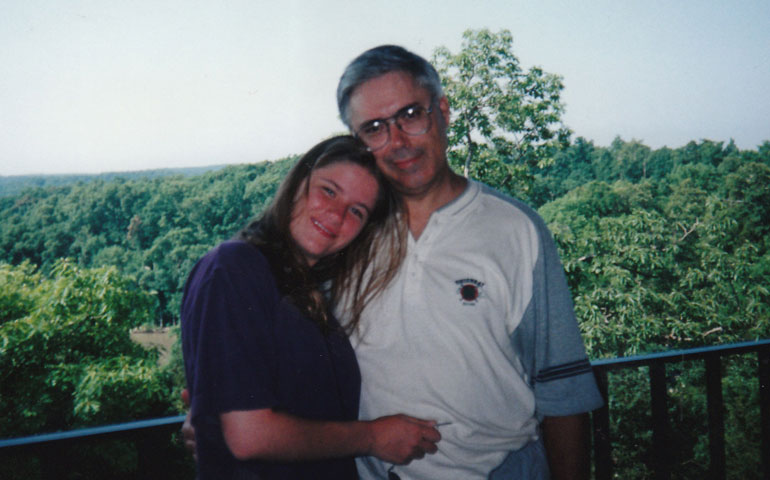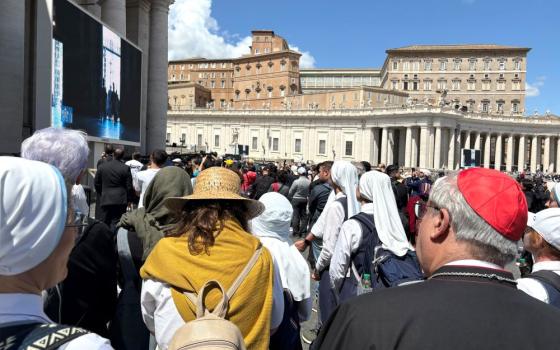
Tom Smith and daughter Karla in 2002, a year before she died by suicide: "I now remember not her death but her life."
Paris Jackson, the 15-year-old daughter of the late singer Michael Jackson, cut her wrists and swallowed a bottle of pills June 6. As she recovers, one in six high school students will seriously consider ending their lives. According to the Centers for Disease Control and Prevention, suicide is the third leading cause of death for 15- to 24-year-olds. Our daughter, Karla, was one of those young adults who found the pain of being human unbearable, and took her own life. What was it all about, and how can a parent bear it?
It was 10 years ago on a dreary, damp, overcast Monday, around 1 p.m. in a windowless, bare, cinder block room just large enough for a king-size bed, a bedroom converted from a storeroom in a vending machine repair shop, in an aging industrial section of the west end of Tulsa, Okla., that our 26-year-old, beautiful, charming, loving, occasionally brilliant, multitalented, bipolar daughter found a hidden .22 caliber rifle, propped it up between the bedspring and the mattress, rested it on her chest, reached down, pulled the trigger, probably with her right thumb, and died instantly as the bullet ripped through her body, severing her aorta with what the medical examiner later described as a "perforating contact gunshot wound of the chest."
Our soul has been weeping ever since.
I miss her. Her mother and her twin brother miss her. We will always miss her. I want to always miss her. But I want to accept missing her. Someday I will. Her death still hurts, but it's getting better now.
At first, grief emotions attacked from everywhere. There was anger in my oatmeal, regret in the trees in my neighbor's backyard, depression drove my car to the grocery store, and frustration hijacked my dreams, my TV, treadmill and prayer.
Why did Karla do it? She didn't do it because God abandoned her or she abandoned God. She didn't do it because we didn't love her. She didn't do it because of a broken relationship, despair over money, failure at college, or drugs.
She did it because our love and the love of friends could not penetrate the depth of her loneliness. She did it because she had bipolar disorder, which sometimes is fatal. She did it because she felt she was an endless burden on the universe. She did it because she had attempted suicide previously, which disabled her innate desire to live. She did it because she saw no other way to end her emotional pain.
All legitimate answers. But they didn't end our questioning, like they would if it had been cancer or an accident. These "Why?" and "What if?" questions hunted me down like tornados swirling into my head and twisting my life into debris. But now, 10 years later, I no longer feel the need to ask the "why" question. The mystery remains and as I pray to see it with the eye of my soul, I know that the answer is "hidden in the mystery of God" (Ephesians 3:9). That is sufficient. That is why it is better now.
Time alone does not heal, not even after all these years. Time alone just helps us get used to the pain. It takes time and work -- for me, grief work. Reading helps. Spiritual direction with my pastor is critical. Prayer, personal and within my church community, is vital. Honest sharing with my family, my wife, Fran, in particular, is essential. Supporting other people who struggle with the mental illness of a loved one or who lost someone to suicide keeps me grounded on my own grief journey.
Fran and our son, Kevin, and I have now assimilated Karla's suicide into our life. I now remember not her death but her life -- her vitality, charm, intelligence, beauty, personality, laughter, passions and flaws -- without the grimy filter of suicide. I can now laugh, talk, read, watch TV, cut the grass, take vacations, grieve other deaths and illnesses, argue politics, critique my church, try to lose weight and go shopping without recalling her. That's assimilation. She is clearly not forgotten, and she remains my child, but her pain no longer dominates my life.
Our family focuses on Karla's lifelong search for spiritual wholeness. We pray with her the prayer that she prayed. It is Karla's serenity prayer:
God, grant me the serenity to accept the things I cannot change,
Courage to change the things I can,
And wisdom to know the difference.
Show me the trace of you in everyone I know.
Gently turn my gaze back home, toward simplicity, grace and gratitude.
Remind me that we are all imperfect, holy and free.
Open me to know and embrace your peace.
[Tom Smith is president of the Karla Smith Foundation, supporting families affected by mental illness and suicide across the United States. He is author of The Tattered Tapestry: A Family's Search for Peace With Bipolar Disorder, and most recently, The Unique Grief of Suicide: Questions and Hope.]
Editor's note: We can send you an email alert every time Soul Seeing is updated. Go to this page and follow directions: Email alert sign-up.


